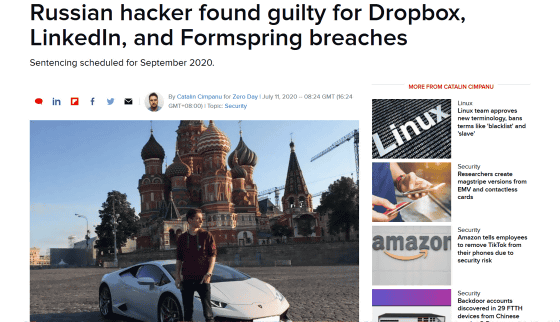The trial of a man who stole more than 100 million user information and caused the largest data leak case in American history is decided

In 2012, a hack was hacked against
Russian Convicted of LinkedIn Hack Spent Years in Custody-Bloomberg
https://www.bloomberg.com/news/articles/2020-07-11/russian-convicted-of-massive-linkedin-hack-by-us-jury
Russian hacker found guilty for Dropbox, LinkedIn, and Formspring breaches | ZDNet
https://www.zdnet.com/article/russian-hacker-found-guilty-for-dropbox-linkedin-and-formspring-breaches/

Convicted Yevgeniy Nikulin, a 32-year-old Russian, launched a large-scale hacking attack on LinkedIn and others in 2012, which actually leaked 117 million user information. This case is one of the largest data leak cases in American history, and the data were sold on the black market, and Nikulin accused had made a large profit.
First, in March 2012, Nikulin defendant infected a LinkedIn employee's laptop with malware and used a VPN to break into LinkedIn's internal network. From here, Nikulin defendant obtained 117 million login information including user name, password, email address, and also used this data to carry out phishing attacks on Dropbox and Formspring and accessed internal data is.
Initially, the data obtained by Nikulin accused was sold in the underground black market, so no damage was found, but in 2015 a huge amount of data was traded on an externally accessible platform Is discovered. Nikulin was accused of traveling the Czech Republic with her girlfriend in October 2016, the year after the investigation began with criminal charges by the affected LinkedIn, Dropbox, and Formspring.

Nikulin seems to have lived a fairly rich life by selling data, and said he owned luxury cars such as Lamborghini Huracan and Bentley Continental GT and highly paid watches. Despite the opposition from him and the Russian authorities, Nikulin was surrendered to the United States in 2017.
The Justice Department seemed to suspect Nikulin had some information about Russia's intervention in the 2016 US presidential election, and Nikulin has since been detained. .. However, not only did Nikulin not accept the plea bargain, but he was suspected of losing his/her responsibility due to mental illness and had to be examined by a psychologist.
As a result, Nikulin's responsibility was recognized, but the trial that started in early March 2020 was interrupted by the pandemic of the new coronavirus. After two postponements, it was finally resumed on July 7, 2020. In this case, judges, Nikulin accused, and defense attorneys wore masks, and witnesses witnessed through the glass panel, and the latest precautions were taken to prevent new coronavirus infection. Court judge Judge William Alsup said that if the attendees of the case were diagnosed with COVID-19 positives in the next two weeks, they would notify everyone else, including through a judge.
Nikulin was guilty after six hours of deliberation, although Nikulin was accused in the trial and criminals criticized the prosecution's efforts to gather evidence. The final ruling is scheduled for September 29, 2020, when Nikulin will be sentenced to 10 years in prison for selling stolen data and 10 to jail for installing malware on a protected device. According to the Ministry of Justice, a total of 30 years or more may be imprisoned for conspiracy, hacking, or theft of personal information in addition to this year.

Related Posts:
in Web Service, Security, Posted by log1h_ik







